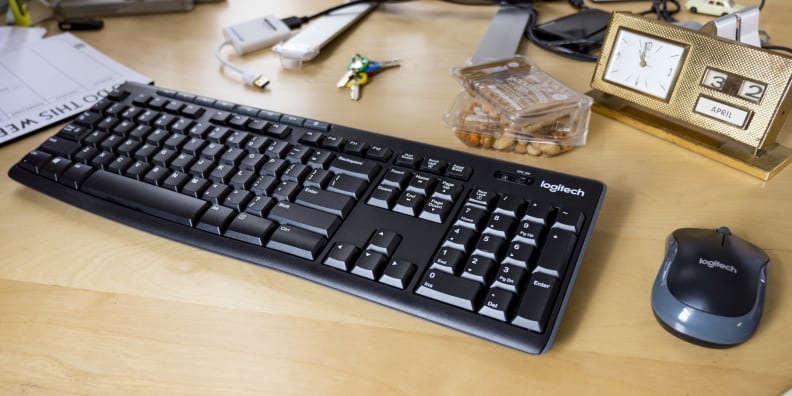

Credit: Reviewed.com / Jeremy Stamas

The Logitech MK850 Performance's keyboard feels nice to type on, and it doesn't have overly-long key throws.

Credit: Reviewed.com / Jeremy Stamas

The Logitech MK270 is a great buy that lives up to the hype.
How We Tested
The Testers
Hey everyone, I’m Mike Epstein. I’m a freelance technology reviewer living in New York. I write about computers and gaming hardware. As it happens, keyboards and mice are a specialty of mine: I’ve written a lot of reviews for them at places like PCMag and IGN. (Not just gaming stuff, don’t worry.)
I’ve been writing professionally on the Internet for most of the decade, so I know how important it is to have a mouse and keyboard that’s comfortable and reliable, and can assess pretty quickly whether or not any given piece of kit will be able to get the job done.
The Tests
Buying a mouse and keyboard together as in a single pack suggests you’re looking for something convenient, affordable, and easy to use. To make sure these kits can do the basics, I tested each combo by using them as my everyday mouse and keyboard on both my desktop gaming PC and my Macbook Pro; browsing the web, writing emails, and playing popular video games like Call of Duty: Modern Warfare and Teamfight Tactics.
I specifically made sure to see how they worked with commonly used apps like Chrome and the Microsoft Office suite. Lastly, because these are wireless products, I tested how far these products could be from their receivers, as well as how comfortable they are to use in non-traditional setups, like sitting at a kitchen table, or with the keyboard in lap on the couch. We also checked out things like ergonomic design, Bluetooth connectivity, wireless connectivity, Windows compatibility, and more.
What You Should Know About Keyboards and Mice Combos
We're willing to bet most people use a keyboard and mouse—or at least a trackpad—almost every day. It's easy to take these tools for granted, but if you spend 40 hours a week (or more) using a keyboard and mouse, you're probably aware that they're not all made equal.
Whether you're trying to invest in a convenient mouse/keyboard combo to pair with a tower PC setup at home or looking to improve upon the keyboard/trackpad experience provided by your laptop, the goal is to secure an ergonomically sound wireless combo with good enough battery life and connectivity to keep up with your use pattern.
Manufacturers can make whatever claims they like about the comfort or usability of their mouse/keyboard combos, but first-hand testing like we've done here is the only way to really know for sure if a combo is worth what you're paying for it. That said, there are some basics worth keeping in mind.
Wired vs. Wireless
Knowing the pros and cons of a wired versus a wireless setup is a simple task, but it's one worth going over. Where mice/keyboard combos are concerned, wirelessness is achieved via a Bluetooth dongle that the products are pre-paired to. Obviously, wired hardware needs to be plugged into the laptop or PC directly, with one USB port dedicated to a wired mouse and keyboard.
With wired products, there's no risk of delayed or interrupted connectivity while typing or mousing through websites. And while a good wireless mouse/keyboard combo won't have any of these issues either, some of them do, and that's one area where testing is crucial.
Naturally, a wireless combo gives you inherent freedom of use, at the cost of worrying about battery life and potential interference. In a vacuum of an identical mouse/keyboard set where one is wired and one is wireless, the wireless variant will usually be more expensive, but that freedom is essentially what you're paying for.
To that end, a wireless combo makes a lot of sense if you want to minimize clutter, but it can also be a good choice if you need a keyboard/mouse set for multiple workstations: it's easy enough to pop the dongle into any laptop or PC you use.
Compatibility
While many headphones and tablet keyboards come in an OS-locked variant (Android or Apple, usually), the Bluetooth connection used by wireless mouse/keyboard combos is universal. This means the same mouse/keyboard combo should be compatible with Windows and other operations systems like iOS.
Other Keyboard and Mouse Sets We Tested
More Articles You Might Enjoy
Checking our work.
We use standardized and scientific testing methods to scrutinize every product and provide you with objectively accurate results. If you’ve found different results in your own research, email us and we’ll compare notes. If it looks substantial, we’ll gladly re-test a product to try and reproduce these results. After all, peer reviews are a critical part of any scientific process.
Shoot us an email
Source link








